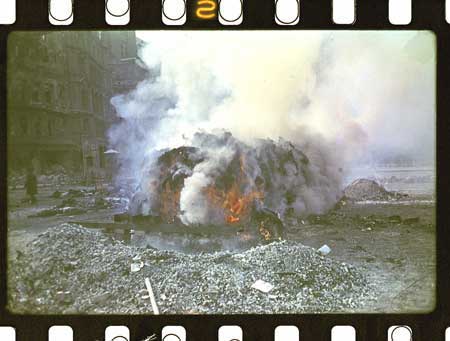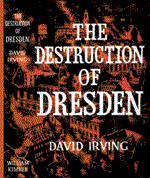DOCUMENTS ON THE DRESDEN AIR RAIDS, 1945

SO
MANY innocents were killed in the 1945 British air raid
on Dresden that the German authorities had to cremate the
bodies on mass funeral pyres on the Altmarkt. Mr Irving
was the first to publish these photographs in the west.
When he produced one of them, enlarged to poster size, in
Court, Defence Counsel Richard Rampton sneered,
"So what!"- MR RAMPTON: Can we forget Dresden for the moment,
Mr Irving?
- MR. IRVING: I can never forget Dresden.
[Transcript, DJC Irving vs Penguin Books Ltd
& Lipstadt, Day
7, January 20, 2000, page 170; copyright photo, taken
on Feb 25, 1945, from Apocalypse 1945: the Destruction
of Dresden]

New York, January 2005   EIGHTEEN years after the end of the war, in
1963, the pro-Nazi historian David Irving published
his first book, The Destruction of Dresden. In those
days, he was either less pro-Nazi than he later became or
more circumspect -- the memory of the war still being fresh
-- but it was probably not entirely a coincidence that he
devoted his first attention to an event that
[Winston] Churchill suspected might be a blot
on the British escutcheon.
EIGHTEEN years after the end of the war, in
1963, the pro-Nazi historian David Irving published
his first book, The Destruction of Dresden. In those
days, he was either less pro-Nazi than he later became or
more circumspect -- the memory of the war still being fresh
-- but it was probably not entirely a coincidence that he
devoted his first attention to an event that
[Winston] Churchill suspected might be a blot
on the British escutcheon.
However, Irving -- later a leading Holocaust denier, who
lost a famous
libel suit against a historian [Deborah
Lipstadt] who exposed him as such -- clearly
accepted in 1963 that there had been a Nazi genocide against
the Jews, and he ended his book with an admission that the
bombing (which he called "the biggest single massacre in
European history") was "carried out in the cause of bringing
to their knees a people who, corrupted by Nazism, had
committed the greatest crimes against humanity in recorded
time."
 David Irving
comments: City Journal is the respected magazine of
the Manhattan Institute. About halfway through
this
article, the author, pen name "Theodore
Dalrymple" (and you can't sound more English, or
rather Scottish, than that) gets to Dresden
and devotes a couple of paragraphs to me and my
first book, The Destruction of Dresden.
"Dalrymple" writes in The
Spectator and elsewhere. I am told that his
real name is Anthony
Daniels, a physician/psychiatrist, who has
worked among (and written about) England's lower
classes and prison inmates for many years.
A kind reader informs me that in
an earlier
issue of City Journal (Autumn 2004) the
obsessive Mr "Dalrymple" wrote a passage which
rather gives the game away: "My mother was a
refugee from Nazi Germany, and though she spoke
very little of her life before she came to Britain,
the mere fact that there was much of which she did
not speak gave evil a ghostly presence in our
household."
Then another reader confirms it:
Dalrymple told an interviewer in Australia one or
two years ago that he is Jewish. Why does he hide
it behind that name, so ultra-British, right down
to the "y" (just like David
Pryce-Jones)?
My advice to Mr Daniels: Get over
it. move on. Stop reliving your mother's life and
times. And stop smearing the native English. IF Daniels is Jewish, it would explain
the venom he has distilled into this article: How
they hate Dresden and all the rival horrors that
that raid created. If he is not Jewish, then I
cannot account for his atttude. He should perhaps
seek help urgently.
As for his grateful, if puzzled,
comment that I ended my book with an admission that
the bombing ("which [Irving] called 'the
biggest single massacre in European history'") was
"carried out in the cause of bringing to their
knees a people who, corrupted by Nazism, had
committed the greatest crimes against humanity in
recorded time," may I deflate his glee by pointing
out that (a) as I have explained in the 1995
edition's Preface, that sentence was inserted
without my knowledge by William Kimber, the
book's publisher and (b) it is accordingly not
in the latest editions.  Related
item on this website:  Our index on the Dresden
raids
Our index on the Dresden
raids
 APOCALYPSE
1945: THE DESTRUCTION OF DRESDEN. A new edition
(above) is in print in Jan 2005 (£27.90),
fully illustrated in colour for the first time, and
fully corrected and updated. The text will also be
available as a free download at
http://www.fpp.co.uk/books/Dresden |
There were faint signs of Irving's later acceptance of
the Nazi worldview in this book, though they probably went
unnoticed at the time. Describing the state of medical
services in Dresden after the bombing, he mentioned that "a
vast euthanasia-hospital for mentally incurables" was
transformed into a hospital for the wounded, without any
remark upon the very concept of a "euthanasia-hospital for
mentally incurables": an institution that by itself would be
sufficient to negate one meaning of his ambiguous
description of Dresden in a chapter heading as "The Virgin
Target." (Did he mean that it had never yet been attacked,
or that the city was an innocent virgin?)Of course, it would be absurd to pretend that the bombing
of Dresden was conducted in order to put an end to the evil
of its "euthanasia-hospital," however vast, or to rescue
Victor Klemperer from certain death. Among other
motives for bombing, no doubt, was the need to demonstrate
to the advancing Russians the tremendous firepower of the
West, despite its relative weakness in land armies. Irving's book was influential, however, precisely because
he hid, or had not yet fully developed, his Nazi sympathies.
It achieved its greatest influence through
Slaughterhouse-Five, Kurt Vonnegut's famous
countercultural antiwar novel, published six years later,
which makes grateful acknowledgment of Irving's book, whose
inflated estimate of the death toll of the bombing it
unquestioningly accepts. Vonnegut, an American soldier who
was a prisoner of war in Dresden at the time of the bombing,
having been captured during the land offensive in the west,
writes of the war and the bombing itself as if it took place
in no context, as if it were just an arbitrary and absurd
quarrel between rivals, between Tweedledum and Tweedledee,
with no internal content or moral meaning¯ a quarrel
that nevertheless resulted in one of the rivals cruelly and
thoughtlessly destroying a beautiful city of the
other. |




